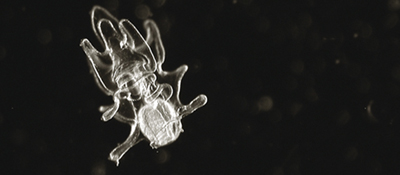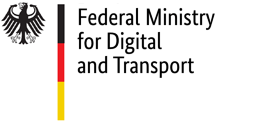Bundesamt für Seeschifffahrt und Hydrographie
Referat S15 - Umweltschutz im Seeverkehr
Bernhard-Nocht-Straße 78
20359 Hamburg

Katrin Ewert
Phone: +49 40 3190-71500
Fax: +49 40 3190-5000
Mail: ballastwasser@bsh.de
BG Verkehr / Dienststelle Schiffssicherheit
Abteilung Maschine
Brandstwiete 1
20457 Hamburg

Holger Steinbock
Phone: +49 40 36137-217
Fax: +49 40 36137-204
Mail: maschine@bg-verkehr.de
Ballast water
- „Stowaways“ in ballast water
- Ballast Water Management Convention
- Exceptional rules from the obligation to D-2
- Complying with the D-2 standard / ballast water management systems
- Problems with ballast water management systems
„Stowaways“ in ballast water
Seagoing ships with little or no cargo on board usually fill seawater into special ballast tanks to lower their centre of gravity. Such ballasting improves the stability and thereby the safety of the ship. However, the ballast water also contains small aquatic organisms such as bacteria, algae and crustaceans. These „stowaways“ are crossing the oceans before being released in coastal waters all over the world where they may create hazards to the environment. Furthermore, they can cause economic damage e. g. by blocking industrial cooling systems.
Ballast Water Management Convention
Due to increasing problems with invasive alien species from ballast water of sea-going ships, the IMO developed the Ballast Water Management Convention (BWM Convention). It entered into force on 8th September 2017 and stipulates the D-2 standard (in German only). This has to be met in order for the ballast water to be deemed save in accordance with the Convention. The D-2 standard can primarily be achieved with an appropriate ballast water management system on board or with ballast water treatment via an external BWMS, e.g. mobile units in ports.
Moreover, IMO has developed several guidelines and circulars regarding the implementation of the Ballast Water Management Convention. You can find them by entering the key word, e.g. ballast water or BWMS, into our Document Search.
Implementation of the Ballast Water Management Convention in Germany
Germany joined the Ballast Water Management Convention on 13th February 2013 with the Ballast Water Act. Additional regulations to the Ballast Water Management Convention and in regard to infringement procedures were stipulated in the “See-Umweltverhaltensverordnung (SeeUmwVerhV)” (ordinance on maritime environmental performance).
Further information regarding the implementation of the BWM Convention in the North Sea and the Baltic Sea as well as practical examples are given in the FAQs on Environmental protection.
Required ship documents
Every ship to which the BWM Convention applies is required to carry the following ship documents on board:
- a Ballast Water Management Plan,
- an International Ballast Water Management Certificate (IBWM Certificate), and
- a Ballast Water Record Book containing any ballast water operations.
Please note: As of 1st February 2025, a new form of the International Ballast Water Record Book is applicable, in accordance with Resolution MEPC.369(80) of the IMO enforced by the 4. SeeKlimaUmwÜEÄndV.
According to the Ballast Water Management Convention, merchant ships with a gross tonnage of 400 and over must have an International Ballast Water Management Certificate (IBWM Certificate). With this certificate, the respective flag state confirms that the management of the ballast water on board the ship complies with the requirements of the BWM Convention. The Ship Safety Division issues these certificates for the German Flag.

Exceptions from the obligation to D-2
If a ship is operated solely between specific ports or places, it is possible for the ship to be granted an exemption from the ballast water management, in accordance with A-4 of the BWM Convention. This is only possible, though, if, on the basis of port analyses and the appropriate risk assessment, a low risk for the environment, human health, property or ressources is expected.
To this regard, HELCOM and OSPAR have developed the “Joint HELCOM/OSPAR Harmonised Procedure on the Granting of BWM Convention Exemptions”. It is based on IMO Guideline G-7 and stipulates an agreed procedure to grant exemptions for the Northeast Atlantic and the Baltic Sea in accordance with rule A-4 of the BWM Convention. The document is continually reviewed by HELCOM and OSPAR and is regularly updated in light of new insights.
Complying with the D-2 standard / Ballast water management systems
Requirements for ships flying the German Flag
Please refer to the Public Announcement regarding requirements for ballast water management systems for ships flying the German Flag.
Approval
The Ballast Water Management Convention stipulates an approval of ballast water management systems (BWMS) by the Flag State whose ships are to be fitted with such systems. The Code for Approvals of Ballast Water Management Systems (BWMS Code) contains the binding details for the approval of BWMS; the Federal Maritime and Hydrographic Agency (BSH) issues the respective type approval certificate.
Ballast water management systems using active substances can only be approved, if has been demonstrated that the active substance ecologically compatible and safe to use. The Marine Environmental Protection Committee (MEPC) of the International Maritime Organization (IMO) approves active substances, supported by the expert group GESAMP (Group of Experts on the Scientific Aspects of Marine Environmental Protection). Approvals of systems using active substances are based on the Procedure for approval of ballast water management systems that make use of active substances (G9).
In Germany, the Federal Maritime and Hydrographic Agency (BSH) is responsible for the approval of BWMS. The BSH is supported by experts of the Federal institute for risk assessment, the German Environment Agency and the BG Verkehr.
By now a sufficient number of BWMS that are in complaince with the IMO standards are available on the market. Find out more about ballast water management systems and their approval.
Problems with ballast water management systems
The following documents contain information on problems with BWMS. The documents describe in detail the possible solutions that can be considered in cooperation with the competent authorities for each individual case and according to the circumstances.

